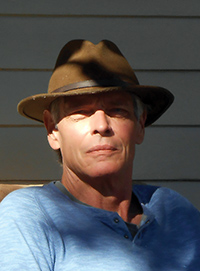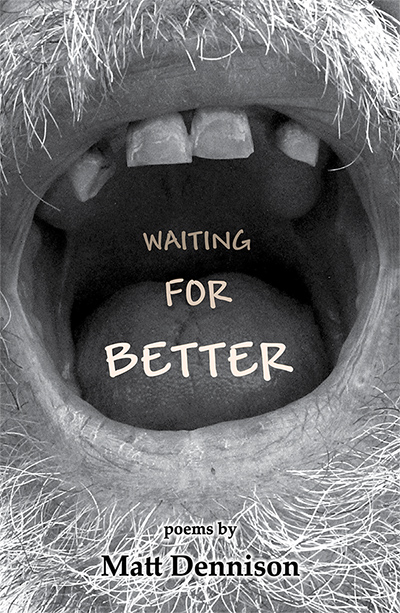Waiting for Better
poems by
Matt Dennison
ISBN: 978-1-59948-867-7, 48 pages, $13 (+ shipping)
Release/Ship Date: May 11, 2021
The Advance Sale Discount price expired March 30. For those who prefer to pay by check the price is $17/book (which includes shipping and applicable sales tax) and should be sent to: Main Street Rag, PO BOX 690100, Charlotte, NC 28227-7001.
 Matt Dennison
Matt Dennison
After a rather extended and varied second childhood in New Orleans (street musician, psych-tech, riverboat something-or-other, door-to-door poetry peddler, etc.), Matt Dennison finished his undergraduate degree at Mississippi State University where he won the National Sigma Tau Delta essay competition (judged by X.J. Kennedy). The author of Kind Surgery, from Urtica Press (Fr.), his work has appeared in Rattle, Natural Bridge, The Spoon River Poetry Review, Cider Press Review and Gargoyle, among others. He has also made short films with Michael Dickes, Swoon, Marie Craven and Jutta Pryor.
I once…I worked in the Texas oil fields…The summer after my first year of college… A collection of recollections. The re-collecting of a life, the gathering up of its barbed lessons. Dennison’s poetry has long entranced me—he serves up moments of the kind of lucidity that can only be separated by fever. ~Guillermo Stitch, author of Lake of Urine.
This collection is a cinematic view into a kind of history in hiding, offering a long, hard look in a mere handful of words. Matt Dennison’s writing always leaves me affected, tender – one way or the other. With Waiting for Better, Dennison has not disappointed, only perfected his craft. ~Michael Dickes
Universal and intimate at once, Waiting for Better weaves a personal connection, bringing magic on the page. These poems invite the reader to immerse and realize a truth. Matt Dennison is a singular talent. ~Tara Isabel Zambrano Author of Death, Desire, And Other Destinations
Picnic
Jane floats her tablecloth across the floor,
sets out fruit, bread, wine, says: Here,
look closely. See the red so forcefully
woven into the curtain? Mother’s blood.
Scattered like burst petals across the sofa?
Mother’s blood. Sit. Everywhere: motherblood.
Soon I will have enough. I will swim.
In the cupped handful I lap I will taste her face.
The gun? I have it. Here, feel the trigger.
The curve guides you in, does it not?
The letter. Read. Can you feel her sorrow?
Can you feel it? My breasts: feel them.
They are heavy with sorrow, have sopped
it from the walls, from the air. She inhabits.
Eat your fruit. There is more. There is always more.
She never departs. Cannot be removed. More wine?
Of course. Pay my cats no mind. They are bad.
They have fattened, those hungry-tongued bitches.
They bite, now. Do not approach.
You know how it is with beasts of no respect.
You have respect. You have felt the blood circling.
You know how, of a sudden, it can spill.
Yet you do not wait. Staring. No, not you.
Enemy Camp
Ed in his white cap holds
the porch railing with his
shaky left hand,
cane working the ground
hesitantly as he smiles,
desiring to approach.
“Ah,” his wife says,
sipping her tea,
observing the sad
spectacle from
the veranda.
“As you can see,
my husband cannot walk. The war—
horrible wounds, not to be
mentioned. His lungs, at first,
black spot small as a quarter
and then the brain which reduces
the spinal column to
grease and gravy
and there you have it.
Shall I pour?”
Later that night, looking out
the window, I see Ed
slide out the back door,
look around twice,
hide his cane behind
the potted flowers then
spread his arms to slowly
rise and fly into
the moon-lit clouds
for a little wifeless
while.
Sunflower
When I was nineteen, lost, alone,
depraved and often raving from
the lack of food and meaning,
walking the streets for days
on end after dropping out
of college the better to sink,
an old man stepped up to me
and said, “Don’t look so down.
Hold your head up. Be proud
you’re a human being,” his words
the key to the lock I could not open
by myself and I immediately went to
my secret place, a circular depression
of rocks hidden by trees, wept until empty
and emerged, later, somewhat cured. Today,
at the Sunflower Grocery after work, dirty, tired,
looking for the shortest check-out line, I noticed
one checker four lanes over with no customers,
though all the other lanes were full. But what
attracted me, more than the empty lane, more
than curiosity as to why no one would use her,
was the pure sadness radiating from fifty feet
away. I went down and said, “You look so
unhappy,” as I emptied my cart, hoping to
make a joke of what I assumed was no
more than boredom or disgust at her
crappy job, engage some engagement
of the common exchange I’ve come to
depend on as a substitute for humanity.
But she did not smile, and I noticed she was
very young, very pale, very pregnant, visibly
exhausted, possibly in pain, possibly, ultimately,
alone at the end of the day. As I paid and gathered
my bags, feeling guilty, for she was about to cry, I said
“Take care, now,” but I didn’t tell her to hold her head up,
didn’t say, “Be proud you’re a human being.” Didn’t even say,
“Hang on, kid, you’ll make it.” I wasn’t brave enough to touch
her where she needed to be touched. Or perhaps I knew to do so
would destroy her in the moment, as she had no easy access to
her crying place. No one is a stranger to pain, and some pain
appreciates the lancing; but other pain, at other times,
is too big to be touched at all.


 Matt Dennison
Matt Dennison